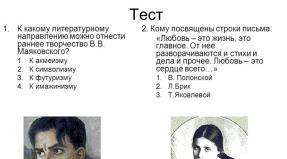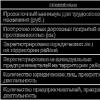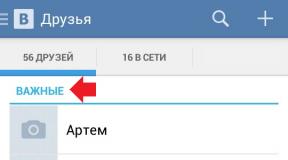Job application form. Job application form: sample, example. The main components of such a job application form
Job application form - the form is optional, but extremely useful. After all, hiring a new employee is like a lottery. After all, the employer often knows practically nothing about the applicant. That is why most enterprises use questionnaires. With their help, the employer will be able to get some idea of the professional and personal qualities of the future employee. In the material of the site, we will figure out what questions can be asked in the questionnaire and how to draw it up correctly so as not to violate legal norms.
Sample of filling out a questionnaire when applying for a job
The existing legislation does not provide for a unified sample of the questionnaire for a job interview. Therefore, employers can draw up it independently, taking into account the specifics of the enterprise's work. However, there is an exemplary list of information developed in practice that can be included in a document:
- personal information of the candidate - full name, date and place of birth, place of residence, citizenship;
- information about education;
- Knowledge of foreign languages;
- the presence of conscription;
- professional skills;
- information about work activities;
- employment goals;
- the presence or absence of a criminal record;
- marital status and family composition;
- hobbies, favorite activities
- personal qualities.
In addition to the listed information, the application form for employment, a sample of which can be downloaded below, may contain other questions. For example, related to lifestyle, habits, and so on. But pay attention to the material presented to the right of the text: be careful with copies of documents.
The presented list can be used as the names of logical blocks in which the corresponding questions will be. A sample job application form for employment is presented below.
A sample of filling out a questionnaire when applying for a job is a template. Employers can take it as a basis when drafting their own document.
Information about education and knowledge of foreign languages
In this block, you can ask the candidate to indicate the names of the educational institutions in which he received his education. It can be not only higher and professional educational institutions, but also various courses and master classes. In the neighborhood, foreign languages that the applicant speaks may be listed. In addition, it is imperative to provide for a column in which the degree of language proficiency will be indicated.
Professional skills and work
Ownership of any programs, the ability to operate devices, as well as a driver's category can be listed as professional skills. Further, information about labor activity is entered. That is, the periods of employment in other enterprises, their name and job title. Quite often, they include a clause requiring a description of functional responsibilities at the previous place of work. In addition, business leaders often want to know why an employee left the previous job.
Employment goals
This paragraph includes questions that help determine the candidate's interest in productive work. Here you can ask about the desired salary level, about the attitude towards business trips and overtime work. It is also advisable to find out what priorities the candidate sets for himself. For this, separate columns with a ranking from 1 to 5. On this scale, the candidate will have to determine what is most important for him in a new place - a friendly team, high salaries, career growth, fulfillment of plans, and so on.
Having a criminal record
The presence or absence of a criminal record is a rather important factor when looking for candidates for positions with financial responsibility, as well as those who have access to classified information. Some enterprises even provide for a special check of applicants on this issue.
Family, hobbies and personal qualities
Despite the seeming insignificance of this information, information about the family, hobbies and personal qualities can help to understand the nature of the applicant and the area of his life interests. The most important point is "personal qualities", because it is here that a person tries to characterize himself. And this will help to understand the level of self-esteem and ambition of the candidate.
What questions should not be asked in the questionnaire?
A job application form for a job seeker is a document that contains personal and sometimes confidential information about a person. Consequently, the person must provide permission to process this information, in accordance with Federal Law No. 152-FZ dated 27.07.2006 " About personal data". At the same time, there are questions that are not recommended to be asked in the questionnaire, as this can be regarded as an invasion of privacy. They may relate to:
- religion and belief;
- political and philosophical views;
- health conditions, except for those issues related to professional suitability;
- details of personal life;
- information about leisure, friends, relatives, acquaintances.
If such questions are present in the document, the candidate has the right not to fill in these columns, like any others that, in his opinion, violate the concept of personal secrecy. From the point of view of the existing legislation, the employer cannot refuse employment to the applicant due to the fact that he left some cells of the questionnaire blank.
How to fill out a sample job application form correctly?
The main rule when filling out the questionnaire is to provide truthful information. When applying for a job, the candidate submits various documents, which in the future can serve as a tool for the employer to check the accuracy of the information from the questionnaire. Moreover, at the end of the questionnaire, the applicant must put a signature confirming the veracity of the data. And for providing deliberately false information, Article 81 of the Labor Code of the Russian Federation, punishment in the form of dismissal is provided.
Job application form (form and sample)
Nowadays, a job application form is not a novelty for anyone. Resume, candidate questionnaire, applicant form, short biography, applicant profile, form or form are filled in at the stage of job search. Some companies also ask you to fill out their own sample employee questionnaire.
The structure of the application form for employment to work in the organization
All parts of the resume should be structured and logically arranged to make it easier for the reader to perceive the information, highlight the most important professional skills, and emphasize work experience.
The presence of links to projects and sites of employers is an important advantage that distinguishes the applicant from the background of other applicants for the vacancy.
The main components of such a job application form are:
- Surname, name of the applicant;
- The position for which the candidate is applying. Also the work schedule (shift, five-day, etc.);
- The level of education (sometimes the profile of education, a specific educational institution and specialty, if the work implies the presence of special training). If there is additional education relevant to the vacancy for which the candidate is applying, we also include it as a separate item in the questionnaire for employees when hiring;
- Work experience with an indication of job responsibilities, the name of the position held in a particular organization, as well as the period of work (month and year of employment and dismissal);
- Foreign language proficiency (indicate language and degree of proficiency);
- Professional knowledge, abilities and skills;
- Possession of computer programs;
- Date of birth (or year of birth);
- Citizenship (sometimes a work permit for foreign citizens);
- Contact phone number (mobile and home);
- Email address (it is advisable to create a separate mail, the title of which contains the first and last name, avoid personalized and diminutive words in addresses such as [email protected]);
- Residence address or metro station (for large cities).
Sample application form for employment
Types of application forms for a candidate for a position in an organization
When compiling a questionnaire for employment, the main attention should be paid to the section that describes work experience, job responsibilities and the name of the position held. You need to indicate the number of employees in the organization and the scope of its activities, provide a link to the corporate website (if available).
It is important to take into account the specifics of the vacancy for which you need to fill out a job application form. If the work experience matches the profile of the position, then it should be described in detail and to the point. This type of document is called chronological (description of places of work in chronological order).
When work experience is concentrated in another area, then the applicant has the opportunity to fill out a resume in the form of a description of professional skills and abilities, and describe the work experience briefly. In this case, the application form for employment will be called functional.
A job application form may contain combined information about both professional experience and places of work, as well as skills and abilities, implemented projects.
Resume types:
- Chronological;
- Functional;
- Combined.
The choice of the type of application for employment is made by the applicant independently, unless otherwise provided by the employer.
Most recruiting agencies and job search sites use their own questionnaire forms. When looking for a job, it is difficult to do without writing a resume.
A number of organizations have developed their own job application forms. In this case, it is necessary to strictly adhere to the requirements of the employer in order to get a job.
A sample of filling out the application form when applying for a job
The questionnaire, translated from French, means investigation. Employers use questionnaires to form a team of employees capable of performing assigned tasks as efficiently as possible, without conflicts or conflicts of interest. A correctly designed questionnaire is the key to success in achieving this goal.
A survey has a different purpose than a resume. A resume is a representative document from a candidate to an employer, in which he focuses on his professional qualities. The questionnaire is compiled by the employer to find out not only the level of professionalism, but also the personal and psychological state of the applicant.
According to the Order of the Government, filling out the questionnaire is mandatory when applying for a job in the state and municipal service on a competitive basis. In other cases of employment, the survey is done at the discretion of the employer.
The document can be short (no more than 10 questions) or detailed (up to 30 answers). The higher the position, the requirements for knowledge and experience, the more information the employer wants to receive.
Thanks to a well-designed questionnaire, it is determined:
- Psychological stability. Indirect confirmation will be information about marital status, the presence of children, place of residence.
- Professional interest: reasons for joining, proposed projects, overtime work, business trips, training.
- Sociability, conflict-free.
The document contains several subsections, each of which has its own semantic meaning. An obligatory part is general information and a photograph. Data on residence, marital status, education, qualifications, specialty, position, work experience must be confirmed by appropriate documents in case of employment. In this case, the questionnaire is included in the employee's personal file.
If a vacancy is refused, the document is saved in the database of the company / organization. In any case, the questionnaire should contain an item on consent to the processing of personal data. The employer is responsible before the law for maintaining their confidentiality.
Who compiles the questionnaire
The standard questionnaire was approved by the Government Decision for applicants for the positions of state and municipal employees. It has its own peculiarity and cannot be used in full by other employers. Each company has the right to develop its own samples of filling out questionnaires for employment, taking into account the specifics of the activity and requirements for candidates.
In large, diversified enterprises, it is impractical to use one type of questionnaire. It should contain two parts: with general information and highly specialized.
The general or typical section contains the data necessary when hiring a job seeker to register a personal file and a worker's card - these are:
- personal information,
- information about relatives,
- education,
- experience,
- questions about a criminal record,
- opportunities to work full time (for disabled people of 3 groups),
- driving license.
The motivational part of the document, where there is a request for the professional ambitions of the candidate, is appropriate for vacancies with the prospect of job growth. This block also includes the question of the expected level of wages.
Completing the filling out of the questionnaire is the question: does the applicant agree to the processing of his personal data.
Specialized issues are included on the proposal of the head, in whose department there is a given vacancy. Here it is required to indicate specific activities: knowledge of foreign languages, programming, accounting, financial reporting, and the like.
Where to get the application form
Ready-made application forms for employment can be downloaded from the Internet, choosing the most suitable option. Specialized sites offer ready-made forms, for the use of which it is enough to print them on a printer.
You can familiarize yourself with the questionnaire of related businesses by taking it as a basis or completely copying it. For example, questionnaires from Sberbank and Aeroflot are posted on the Internet. Reputable enterprises have a highly qualified staff of lawyers, psychologists, personnel officers who have developed samples for internal use.
How to fill in correctly
Attention! Filling out the questionnaire is offered immediately before the interview.
At the same time, it is assessed how quickly, competently, accurately it is drawn up. Carelessness, indistinct handwriting, corrections will form a negative impression of the candidate. In order to avoid such a mistake, you must first familiarize yourself with the typical content by downloading a job application form. Prepare documents from which information will be entered.
Inaccuracies, misspellings, questions must not be allowed. The applicant must understand that the personal information will be verified with the submitted photocopies of the passport, diploma, certificates. And the documents themselves will be checked for authenticity.
Sample filling
A sample version of the questionnaire begins with a table of contents and posting a photo, for example: vacancy _______________ photo.
Then, after the title of the document, follow:
- FULL NAME _______________________________.
- Data on date of birth, citizenship, place of residence, registration, passport information, contacts (home, mobile phone, e-mail).
- Family status and information about parents, children.
- Educational qualification: indicating the period of study, the name of the educational institution, the diploma specialty. Then, if any, refresher courses, the second specialty, are listed. Knowledge of languages, use of software products is indicated.
- Work experience (countdown): periods of work, company name, position.
- Additional information regarding driver's license, criminal record.
- Clause on consent / disagreement with saving personal information in the database.
Attention! The document should not contain questions of a discriminatory nature: about nationality, faith, state of health.
Filling out a job application form is an intermediate stage before the interview and making a decision on choosing a candidate. There are survey requirements for both parties: the employer and the candidate. Questions should be laconic, understandable, not infringing on rights. Answers should be written in essence, avoiding distortions, corrections, in legible handwriting.
Job seekers are often perplexed: why do you need to fill out a job application form, if the employer has already been provided with a resume for review? And sometimes you may come across the opinion that a written questionnaire in employment is useless, because it can be replaced by an interview. No, he can not. Neither a resume nor an interview is a full-fledged substitute for questioning when applying for a job.
Every employer knows that in the resume the candidate tries to present himself in the best light and may not indicate information that is unfavorable for him (for example, temporary jobs, the presence of small children). Moreover, the main purpose of a resume is to obtain an invitation for an interview.
The questionnaire is the first stage of direct acquaintance between the employer and the future employee. The interview is his second stage.
Below you will find samples of an applicant's questionnaire when applying for a job and a sample of filling out a questionnaire when applying for a job. From them it will become clear that the employer, using a questionnaire, can get:
- general information that determines the legality and expediency of further interaction with the candidate for a vacant position;
- an adequate initial assessment of his professional qualities, which is necessary for making a decision on admission.
For the applicant, this document is equally important, since it may contain questions, the answer to which is not contained in the resume. And besides, the potential employee himself learns a lot about future employment.
In this regard, a sample application form for a job candidate is a more objective document. The questionnaire for an applicant for a job contains a list of mandatory items that allow you to assess the candidate, his professional level and personal qualities in more depth. Looking through the information specified in the questionnaire, employers pay attention to even such seemingly trifles as:
- the level of literacy of the applicant;
- accuracy of filling;
- the amount of time spent filling out the form;
- completeness of the data provided;
- attentiveness, etc.
It will not work to evade answering an uncomfortable question without answering it in the questionnaire - the employer will ask it anyway. So it's best to be honest.
Also, the emotionality and mood with which the candidate comes to the interview are assessed.
Thus, the sample job application form reveals the socio-psychological characteristics of the job seeker, which simplifies selection.
For whom the questionnaire is required
According to the Decree of the Government of the Russian Federation No. 667-r dated May 26, 2005, the questionnaire must be filled out by citizens wishing to take part in competitions for vacancies:
- state civil service;
- municipal service.
In all other cases, the questionnaire is not included in the number of documents required for employment ( Art. 65 of the Labor Code of the Russian Federation).
But many businesses develop their own sample job interview questionnaire and use it to evaluate a candidate.
All information about the applicant, which is indicated in it, is confidential information and is not subject to publicity ( Art. 86 of the Labor Code of the Russian Federation). If the confidentiality is violated, the employer can be prosecuted.
What questions does the sample job application form contain?
The application form for hiring contains from 10 to 30 points, the answers to which the employer wants to receive from the candidate. Also, the questionnaire can be filled out electronically.
A job application form, a sample of which we have posted below, may contain the following items:
- FULL NAME. vacancy applicant;
- Date and place of birth;
- citizenship;
- actual address and place of permanent registration;
- phone, email address;
- passport data;
- education (including additional and courses);
- the presence of a medical book;
- information about labor activity for a certain period of time: (place and period of work, position, duties, wages);
- professional skills and abilities;
- marital status and information about close relatives;
- hobby;
- strengths and weaknesses of character;
- wishes for working conditions and wages;
- the presence of a driver's license;
- level of proficiency in foreign languages and PC;
- the presence of chronic diseases;
- recommendations from former employers.
The employer must understand: for the questionnaire to be as informative as possible, the questions contained in it must sound clear and concise. They must also imply a precise answer.
Enterprises that require filling out a detailed questionnaire for the device (for example, banking structures) should take care in advance about documenting the voluntary nature of the provision of personal data, for which it is required to obtain the written consent of the candidate, in accordance with Article 9, paragraph 4.
How to write a questionnaire correctly
We offer some practical advice on drafting. It is very convenient when questions are grouped by topic. This will facilitate the work of both - the interviewer and the interviewee.
We propose to divide the questionnaire into two parts: general questions - in one part, highly specialized - in the second. This division facilitates the use of a single form of the questionnaire for a large enterprise, since the first part of it will be the same for candidates for vacancies in any workshop or department of the enterprise.
General issues
In the first part, the standard points usually go first:
- Date of Birth;
- residence address;
- Contact Information;
- marital status;
- children;
- attitude to military service;
- the presence of a criminal record.
Education
- educational institutions in which he studied (with years, assigned qualifications and diploma numbers, which, if necessary, can be checked);
- advanced training courses, attended seminars, master classes and conferences;
- the degree of proficiency in foreign languages.
If the last point is important directly for the position held, we recommend that you check your real language proficiency during the interview, since the candidate's self-assessment of his language skills often does not correspond to the real state of affairs.
Employment goals
Questions can then be asked to help understand the applicant's goals for future employment. We suggest including questions that reveal the motives and goals of the applicant. Examples of such questions:
- what position he would like to occupy now;
- whether he wants to make a career;
- whether there is a desire and / or an opportunity to work overtime and on weekends;
- how the candidate treats business trips.
A great way to understand an applicant's personality is with preference lists. For example, suggest ranking the list of benefits the candidate would like to have in this job in order of importance:
- good team;
- decent salary;
- growth prospects;
- upgrading or obtaining qualifications;
- proximity to home;
- flexible schedule.
By ranking such a list, a potential employee will reveal his preferences and thereby reveal himself. It makes sense to suggest adding your own version to the ranked list.
Candidate health
Whether it is necessary to ask questions about the health of a potential employee, each employer decides for himself. This is a rather slippery question. In fact, such questions can amount to interference with privacy.
Nevertheless, disability and chronic diseases that require regular inpatient treatment are quite important information that will affect the obligations of the employer towards the employee (provision of benefits, etc.).
We propose the following rather tactful formulations:
"Do you need special working conditions due to your health condition?"
"Do you need an extra day off to care for a relative?"
But it must be remembered that the refusal to provide a job for a person with health limitations (if these restrictions do not affect his ability to perform the assigned work) may be a reason for going to court.
Personal qualities
And, finally, an even more painful point in the first part of the questionnaire is personal qualities. These questions cause not only a negative reaction from the respondent, but are also extremely ineffective, since a person rarely can and wants to adequately assess their merits and demerits, especially when hiring. We can offer to re-use the ranking of the list, however, this method is quite ineffective. Better to use the oral interview method.
Experience and skills
Having finished with the first, general, part, we move on to the second, highly specialized, which we recommend starting with obtaining information about work experience. The structure of this section should serve two purposes:
- Provide the employer with the necessary information about the job skills of the candidate. For this, the professions, who he worked by, the positions held, the list of duties performed must be indicated.
- Get an idea of the candidate's communication skills and mental stability. To do this, they ask about the reasons for the change of job and ask the candidate to name one or two former employees who are able to give characteristics and recommendations.
A highly specialized questionnaire is required to obtain relevant information about work skills. When filling a driver's vacancy, they are interested in the category and time of obtaining a license, driving experience. If a programmer is being questioned, they ask questions about proficiency in certain programming languages, specific software products created by this applicant. This section should be compiled by the immediate supervisor of the future employee, because it is he who knows what skills the future employee will need in the new place. This is a very important item on the questionnaire. No matter how sociable and stable a candidate is, if he does not have the necessary labor skills, he is unlikely to cope with the proposed functionality.
What the applicant should not write on the job application form
Despite the fact that at the moment there are no legally approved forms for the questionnaire, the law does not allow the employer to include in it whatever he pleases.
How long should the questionnaire be?
Sufficient, but not excessive. We also recommend asking questions tactfully, so as not to scare off potential employees, and to minimize the number of personal questions. It makes sense to ask only what is directly related to the future position and assumes the possibility of a reliable answer.
Recall that the law obliges the candidate for a vacant position to be honest in providing personal data, giving the employer the right to terminate the employment contract in case of using forged documents ().
How to make sure that the questionnaire is filled out correctly
First of all, you need to check the availability of answers to all the questions posed. The next step is to verify the data provided with the data of the passport, diploma and other documents. The third stage can be verification of the authenticity of the data and documents provided.
Sample of filling out a questionnaire when applying for a job
In this section, we have posted a sample application form for a job applicant.

What happens to the questionnaire after filling out? Information about all candidates is entered into the enterprise database (subject to the person's consent to the processing of personal data). When a new vacancy appears, a candidate who has not passed the selection may be remembered and again invited for an interview. It is possible that the second attempt will be successful. If employment has taken place, the questionnaire is filed along with other documents in the employee's personal file.
Anyone who processes admission documents has access to personal data, and, therefore, must be warned about the observance of confidentiality (Federal Law of the Russian Federation No. 152 "On Personal Data", article 6, paragraph 3). According to the law, the head of the enterprise bears responsibility to the state for the actions of the operator.
When applying for a job in a business entity, a job application form is of great importance. It is important both for the candidate for the position and for the representative of the company's management. A questionnaire is drawn up before the interview. The form of this document is offered by the representative of the company to the job applicant, who fills it out.
 An employment questionnaire is a document in which a future employee reflects, according to a certain list of questions, basic information about himself, existing education, work experience, etc.
An employment questionnaire is a document in which a future employee reflects, according to a certain list of questions, basic information about himself, existing education, work experience, etc.
That is, this form contains all the necessary information about the applicant, on the basis of which a representative of the administration will be able to decide whether this candidate is suitable for fulfilling his job duties for an open vacancy at the enterprise or not.
Attention! Professionals should not forget that questionnaires are the starting point of the future, and interviews cannot be substituted for filling out questionnaires.
If an interview is conducted, then the employee conducting it, on the basis of the information specified by the candidate in the questionnaire, interrogates him, thereby identifying the qualities and skills, determining the qualifications.
The questionnaire defines the main ones.
The job application form must be correctly drawn up and contain a predetermined list of information required for the interview. It is best to group questions thematically into sections.
Important! You cannot include in this document questions affecting the private life of the candidate. And before compiling, it is recommended that this person give consent to the processing of his personal data, so as not to violate the current legislation.
The questionnaire can be used to study the documents submitted by the candidate. In this case, it may be less detailed and formal.
On the other hand, the questionnaire is also important for a person applying for a position in the company - when compiling his resume, he may omit some important information that is important for working in this company.
By answering the questions in the questionnaire, the candidate will be able to find out some information about his future employer, for example, how much he is interested in the needs of his staff and appreciates employees.
The form of the questionnaire is not regulated by law and, as a rule, is developed by the employer in accordance with the existing features of the activity.
Attention! If a candidate is hired by a firm, then the questionnaire is included in his personal file. On the basis of it, this register can be formed in the future, just like an employee's personal card.
Which is better - a profile or a resume?
There are several documents that an employee draws up when applying for a job at an enterprise. Among them, the main ones are the questionnaire and resume.
They have a lot in common, but there are also differences. The main one is that in the resume, the candidate for the position reflects information about himself, based on what he wants to tell. Filling out a job application form takes place according to a list of questions determined by the employer.
Many job seekers come with a pre-prepared resume, which they pass on to the company's specialists for study.
Attention! Most often, personnel officers are often asked, even with a detailed resume, to fill out a questionnaire on. The candidate is recommended to agree to this proposal, as this will increase his chances during the interview, because all the questions of interest to the administration will be reflected in the documents.
However, some questions that are fully reflected in the document submitted by the employee may be indicated in the answers “See resume "(in this case, it must be attached) or you need to rewrite the information from the resume (then it can not be transferred to the employer's representatives).
Sample Employment Application Form
Download in Word format.
Download in PDF format.
How to fill out a job application?
If a company offers to fill out a questionnaire when applying for a job, during this process it is necessary to adhere to some rules. Their implementation will allow you to show yourself in the eyes of the future employer from the best side, and will provide an opportunity to form an opinion about yourself even before the actual interview.
These include:
- You should not refuse to fill out the proposed questionnaire, even if you have a detailed resume with you;
- Before filling out, it is recommended that you read all the questions in full, clarify the wording for those that are not clear, and also think over the answers to related questions (so as not to duplicate information);
- You need to fill in legibly, accurately, without errors;
- In each item, add as much specific information as possible, avoid "water";
- Realistically assess your desires and capabilities before paying the salary you are interested in;
- To accurately indicate personal data, you must have various documents or copies of them with you - a passport, educational documents, work book, TIN, SNILS, etc.;
- Often you need to stick a 3x4 photo on your profile. You need to be ready for this (have such a photo with you).
Conventionally, a job application form is usually divided into five parts.
Personal data
 Here, one by one, in the corresponding columns, are entered:
Here, one by one, in the corresponding columns, are entered:
- Full name and surname;
- Date of Birth;
- The citizenship of which country is available;
- Place of residence (not an address, but geographically - locality, subject, etc.). Very often, this point is important for the employer, since living in another region (city) and, accordingly, the employee's expenses for the round trip remove his reliability;
- Full address of the place of residence;
- Full address of registration;
- Contact information - landline phone, cell phone, Skype, e-mail, etc. This is important for prompt communication and clarification of all questions that have arisen;
- Data of the passport or any other document confirming the identity of the applicant;
- Family status. This is another important point, since it characterizes the degree of responsibility and the need for constant earnings of the applicant. A single employee can easily "sort out" jobs to find a suitable option for him.
- Information about the relatives. Usually it is required to indicate the full name, place of residence and work, degree of relationship, etc. On the other hand, such information refers to personal data, and the applicant has the right to refuse to provide it.
Education information
 This section usually contains tables in which it is necessary to enter the name of educational institutions, specialties received and the period of education.
This section usually contains tables in which it is necessary to enter the name of educational institutions, specialties received and the period of education.
The second table or column is information about additional education, refresher courses, trainings, etc.
Based on the information from this section, the employer will draw a conclusion about the existing qualifications, learning ability, and, in general, the prospects of the candidate.
Skill information
 In this section, there are usually columns in which it is necessary to reflect what the applicant can do. A separate column, as a rule, is assigned to the possession of a computer - in it it is necessary to mark or enter with your own hand those software products that the employee knows how to use.
In this section, there are usually columns in which it is necessary to reflect what the applicant can do. A separate column, as a rule, is assigned to the possession of a computer - in it it is necessary to mark or enter with your own hand those software products that the employee knows how to use.
If the applicant applies for any managerial or managerial position, then the questionnaire may also contain columns for information about how many people were in subordination, what projects his department was able to implement, etc.
Attention! One of the columns that is always present in the questionnaire is the degree of language proficiency (I speak fluently, read and speak with a dictionary, etc.). This point is important if, in the course of work, contacts with foreign partners, buyers, etc. are coming.
Motivation and work experience
 This section contains information about the applicant's previous jobs, as well as his motivation - what he wants to achieve, what salary to receive, etc.
This section contains information about the applicant's previous jobs, as well as his motivation - what he wants to achieve, what salary to receive, etc.
One of the mandatory columns in this part of the questionnaire is information about the referee - that is, a person from a previous job who can give a candidate, describe his merits and demerits.
It is very important to fill out this item, since omitting it may mean that in previous companies the applicant does not have the highest opinion of the skills, and he does not want to show it. And this fact, in turn, will reduce the candidate's chances of getting the position of interest.
Then, in the form of a table, you may be asked to provide information on previous jobs. It is best to enter information here as accurately as possible, using a labor one for this.
Attention! Often in the questionnaire there is a column "Reason for dismissal". When answering this question, there is no need to scold the previous management, colleagues, position, etc. It is desirable to indicate this information, but it is best to use correct neutral wording - no further growth, small salary, etc.
Another interesting graph is the expected salary (in general, in a year, 2 years, etc.). You need to evaluate your needs - too high a desired salary with mediocre experience and skills will be the reason.
other information
 This section introduces other questions about the applicant that are not related to the direct performance of duties. There may be questions about the advantages and disadvantages of the candidate, hobbies, a column for other information that the applicant wants to communicate about himself.
This section introduces other questions about the applicant that are not related to the direct performance of duties. There may be questions about the advantages and disadvantages of the candidate, hobbies, a column for other information that the applicant wants to communicate about himself.
At the same time, some questions are of a psychological nature - the employer is not so much interested in the advantages and disadvantages as in the very fact of their recognition. If the applicant believes that he has no shortcomings, this is a reason to doubt his sincerity, or an unwillingness to recognize them for himself.



















